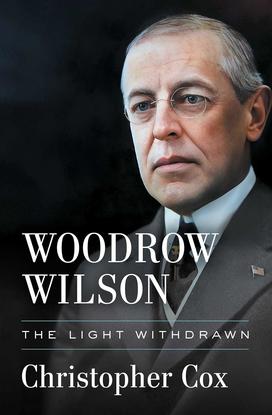Woodrow Wilson 1879 Biography Reflects on Complicated Past
The book: In this new biography of Woodrow Wilson 1879, author Christopher Cox offers a new assessment of the political figure who served as the 28th president of the United States. This includes detailed analysis of Wilson’s deeply problematic positions on civil and political freedom for Black Americans and women. Cox leans on his own political experience to offer a thoroughly researched profile that puts Wilson’s life in context. Woodrow Wilson (Simon & Schuster) offers a more nuanced profile of a figure who deserves both praise and criticism.

The author: Christopher Cox is a senior scholar in residence at the University of California, Irvine, a life trustee of the University of Southern California, Chair of the Rhodes Scholarship selection committee for Southern California and the Pacific, and a member of several boards. Between two decades as a practicing lawyer, he served as chair of the Homeland Security Committee in the U.S. House of Representatives, chair of the U.S. Securities and Exchange Commission, and senior associate counsel to the president. He has written for many publications including Fortune and The Wall Street Journal.
Excerpt:
Chapter Fifteen
“A Conviction All My Life”
For months, Wilson was nearly disabled with grief, falling into a deep depression. Two weeks after Ellen’s funeral he declared himself “exhausted,—dead in heart and body, weighed down with a leaden indifference and despair.” At the end of August, he told Colonel House “there was nothing left in him worthwhile.” By November he had made little emotional progress; he still lamented he “had no heart in the things he was doing.” He confided to Colonel House, not for the first time, he wished “someone would kill him.” But events rushed forward regardless: the war, the financial crisis, a labor crisis to which he had detailed Dudley Field Malone. Not least of all, the midterm elections now came on hard and fast, putting Wilson’s first two years in office to the ballot test.
While there was near-universal support for Wilson’s declaration of neutrality, the worsening economy hurt incumbent Democrats, who controlled not only the White House but also both houses of Congress. Republicans campaigned against Wilson’s proposed tax increases and urged curtailing extravagant government spending instead. The 1912 split between regular Republicans and Progressives was mostly healed, wiping out what had been Wilson’s main advantage.
A wild card was the impact of the Congressional Union campaign in every state where women already could vote, explaining how the federal amendment was being blocked by President Wilson and the Democratic caucuses in both the House and Senate. The campaign urged women voters to send a message by voting against Democrats up and down the ticket. As Paul lieutenant Florence Brewer Boeckel explained in a retrospective on the 1914 election, their message to the voters was crystal clear. “Do not use your votes to send back to power the party that has . . . opposed the freedom of women at every turn.” Women, they exhorted, must “recognize and acknowledge that they have an enemy, the Democratic Party.”
When the ballots were counted following the midterm elections, the Democrats had hung on to control of Congress — though in the House, just barely. Republicans gained sixty-two House seats, nearly enough for a majority. The House Democratic leadership surely felt the sting of the Congressional Union’s campaign barbs, even though, with no exit polls at the time, it was difficult to assess the precise impact of its pro-suffrage, anti-Democrat message on the overall results.
In the Senate, where for the first time candidates were chosen by popular vote instead of by state legislatures, Democrats gained a net three seats. Most of the Democratic incumbents were protected by the fact that two-thirds of them did not face reelection that year. But what losses the Democrats did suffer can be directly attributed to the Congressional Union campaign. Among the 23 losing Democrats who faced Congressional Union opposition, three were senatorial candidates previously thought to be safe bets. The Democrats lost exactly three Senate contests that year. Incumbent George Neeley in Kansas, who had expected he was “certain of election,” lost his race narrowly, along with James Moyle in Utah and James Hawley in Idaho, both of whom had also seemed assured of victory. With these results, Charles Beard observed in the New Republic, Paul’s Congressional Union had “thoroughly frightened Democratic politicians from the West.”
What ought to have been especially concerning to party leaders is that the Congressional Union had stirred up all this trouble with only two field representatives in each suffrage state, and sometimes only one. Paul made it clear her low-budget campaign in 1914 was just a trial run. If Wilson and his party again failed to deliver the women’s suffrage amendment, Paul said, the Congressional Union would campaign against Democrats in every state. With two years to plan, she promised, the next campaign would be far better funded.
“I don’t want politics brought into it,” Wilson barked at William Monroe Trotter, who sat across from him in the White House on November 10, one week after the 1914 midterm election. Trotter had just told Wilson that as a result of his broken pre-election promise of “absolute fair dealing” on racial matters, Black leaders who “supported the Democratic ticket in 1912” were now denounced as “traitors to our race.”
Black voters, Trotter reminded the president, had “made plain enough to you their opposition to segregation last year by a national anti-segregation petition,” which he himself had presented to Wilson in the White House. Now these voters had spoken more emphatically, “by a protest registered at the polls, voting against every Democratic candidate save those outspoken against segregation.”
The election was still a sore spot for Wilson. Republicans’ near-record gains in the House, along with nine new governorships, had come in part through the continued loyalty of the vast majority of Black voters. But the president’s quick temper was also traceable to his continued depression. “My own individual life has gone utterly to pieces,” he sighed just two days before the Trotter meeting in a letter to Mary Hulbert. (This was her new name, ever since her 1912 divorce from Thomas Peck.) “I do not care a fig for anything that affects me.” The only thing that interested him, he confessed, was “GOLF,” which he capitalized to show his enthusiasm. He “could laugh aloud to see the papers.”
But here were Trotter and his delegation, back again one year after their last White House meeting, intent on discussing serious business. Wilson knew full well he had not only failed to live up to his civil rights pledge, he had forced the cause a giant step backward. He resented Trotter for pointing it out, but he could hardly have been surprised. He bent his frustration back on his guest. In response to Trotter’s detailed presentation of segregation throughout his administration, Wilson patronizingly explained that “segregation [is in] the best interests of both races in order to overcome friction.”
Trotter held his ground. “For 50 years, white and colored clerks have been working together in peace and harmony and friendliness,” he told Wilson, until “your inauguration.”
Rather than seek accommodation with his determined former supporter, Wilson dug in. “Segregation of white and negro civil service employees,” he announced, “is to be continued.” This unqualified presidential edict would be page-one news in the following day’s New York Times.
Undaunted, Trotter pressed on. Four of Wilson’s Republican predecessors, Trotter reminded the president, had appointed Black men as Register of the Treasury, a prominent position whose duties included signing every piece of U.S. paper currency. Wilson had considered nominating a Black man, Adam Patterson, but decided to break the thirty-year tradition when southern Democratic senators objected on racial grounds. Despite receiving McAdoo’s personal assurance that he had “spoken to each of the Senators about [Patterson] and they approve his appointment,” Wilson withdrew the nomination only days after announcing it.
“You say you could not get a nomination confirmed,” Trotter pressed. “Was such a nomination made and presented to the Senate?” Wilson could not deny that he never fought for the nomination. But he attempted to lay responsibility at the feet of “the Senate,” though his immediate predecessors in office had all overcome the same opposition he faced. He even suggested Patterson himself was to blame for the withdrawal of the nomination, claiming it was “no suggestion of mine.” (Patterson, for his part, had announced publicly that the appointment was “the prize I have strived for all my life.”)
The full truth was worse than Trotter knew. Wilson spelled it out in private correspondence with Thomas Dixon. The president confessed the only reason he had even considered appointing Patterson to lead this Treasury bureau was that he had first segregated it. That way, there would be no “Negro men over white women employees of the Treasury Department,” a possibility Dixon had complained about to Wilson. The president assured Dixon he had “a plan of concentration which will put them all [Black federal employees] together and will not in any one bureau mix the two races. This change has already practically been effected in the bureau in which I proposed the appointment of Patterson.”
Wilson’s stubborn defense of segregation during the meeting provoked a sharp rebuke from Trotter. “We are sorely disappointed that you take the position that the separation itself is not wrong, is not injurious, is not rightly offensive to you,” he told the president. That pushed Wilson over the edge. “You have spoiled the whole cause for which you came,” he fumed. “Your manner offends me.” Wilson told Trotter he would never again be welcome in the White House.
It was the end of all the hopes that Trotter and other civil rights leaders had held out for Wilson. Though a socialist by inclination, Trotter would turn his support to Republican Charles Evans Hughes in the next presidential election.
After the meeting, Wilson commiserated with his fellow segregationist Josephus Daniels. “I was damn fool enough,” he groused, “to lose my temper and to point them to the door. What I ought to have done,” he told Daniels, was “said to them that, of course, their petition would receive consideration. They would have then withdrawn quietly and no more would have been heard about the matter.”
Excerpted from Woodrow Wilson by Christopher Cox. Copyright © 2024 by Simon & Schuster. Reprinted with permission.
Reviews:
“A stunning chronicle.” — The Washington Post
“Highly readable, compendious, eloquent.” — Barksdale Maynard, award-winning author of Woodrow Wilson: Princeton to the Presidency












1 Response
Norman Ravitch *62
1 Year AgoWilson After World War I
The current focus on Woodrow Wilson’s Southern ideas and prejudices is notoriously wrong. He was a proud Southerner and had typical Southern attitudes. What he should be faulted for instead was his weakness at the Paris Peace Conference after World War I, where he failed to face up to the outrageous demands of the French and British leaders.